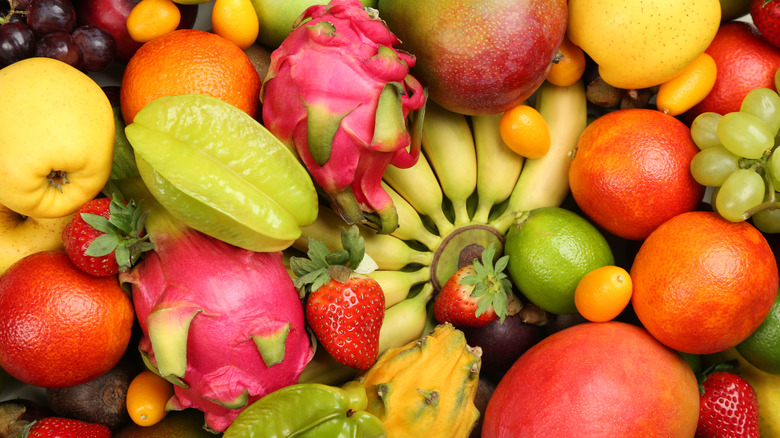When You Only Eat Fruit Every Day, This Is What Happens To You
Fruit is healthy, this we know. But is there a line that can be crossed when it comes to eating colorful, sweet delicacies from nature? While becoming a fruitarian may not be on your radar, it is a way of life for many people. Fruitarians are those who consume only, or almost only, fruit. Basically, it is like a plant-based diet on steroids.
Fruitarianism is one of the most restrictive diets you can employ and because of this, it might not offer the best bang for your buck in terms of nutrition. If you have experimented with only eating fruit, you've likely become acquainted with the startling gastrointestinal pyrotechnics that follow the consumption of such epic amounts of fiber (via Live Strong). Whether you are considering fruitarianism as a lifestyle change or as a "reset" for your system, there are plenty of potential health repercussions that should be considered before you go ham on Carmen Miranda's hat.
You might experience weight fluctuations
Eating only fruit every day could lead to weight loss or weight gain, and it is hard to predict which could occur within your body. If you go from eating a standard American diet to only eating fruit, you are likely to lose weight initially. However, if a fruit-only diet goes on for too long, it might send your body into "starvation mode." This essentially means that your body will begin to break down lean tissues for energy, which is not its preferred way to function (via Live Strong).
Conversely, if you go hard into a fruit-focused diet but emphasize high-calorie fruits, you are actually more likely to gain weight through this approach. If your fruitarian diet has you reaching for you avocados (which are super calorie-dense) and other stacked fruits, you are likely going to be consuming more calories than your body can expend, according to Live Strong.
You will likely experience nutrient deficiencies
Perhaps one of the most concerning complications regarding a fruit-only diet is nutrient deficiencies. Eating only fruit is really restrictive — and by cutting out so many other healthy foods, you won't be setting your body up for success. Fruits alone do not contain all of the vitamins and minerals that our bodies need, which is why fruitarianism can leave our bodies desperate for more.
Specifically, only eating fruit every day will likely leave your body in need of iron, zinc, omega-3 fatty acids, calcium, vitamin D, and B vitamins (via Medical News Today). Each and every one of those nutrients is essential for optimal function. Over time, neglecting to consume these nutrients in adequate amounts can leave you with fatigue, cognition troubles, depression, weakened immunity, muscles, and bones, and issues with your skin and hair. In some cases, a lack of these nutrients can lead to issues that spiral into life-threatening complications.
You will increase your risk of dental complications
You probably already know that most fruits have a high sugar content. But did you know that even fruit sugars can affect your overall dental health?
It's not just the influx of sugar that can wreak havoc on your mouth if you embark on a fruit-only journey. The acids in citrus fruits can be especially damaging. In fact, the acids in lemons, limes, grapefruits, and other citrus fruits can damage the enamel more than the sugars in fruit. Even pineapples and cranberries are considered to be acid fruits (per Verywell Fit). This is especially true in people who do not have solid oral hygiene. Even drinking fruit juices heightens this risk (via Medical News Today).
To minimize the dental damage that can be caused by only eating fruit every day, experts recommend rinsing your mouth with water after consuming an acidic fruit. Of course, it is also recommended that you brush your teeth twice a day and floss daily. Medical News Today reports that compared to a typically balanced diet, eating fruits exclusively likely subjects the teeth to more acid.
Your blood sugar will become more volatile
As we know, fruits typically contain a significant amount of sugar, often in the form of fructose. Even though all carbohydrate-containing fruits can cause fluctuations in your blood sugar, some cause your blood sugar to spike more dramatically than others. This is all recorded and easy to understand via the Glycemic Index. Foods are ranked by the effect they have on your blood sugar on a scale of 0 to 100. The lower the GI number, the less aggressive the blood sugar spike; the higher the number, the more drastic the blood sugar spike caused by that specific food is (via Healthline).
Emphasizing a balanced diet is a great way to ensure that your blood sugar levels don't skyrocket. This is a bit trickier if you opt to follow a fruit-only diet, as everything you are consuming likely contains carbohydrates, the macronutrient responsible for causing blood sugar fluctuations. Medical News Today states that fruit-focused diets are not suitable for those who already have "unstable blood sugar." When in doubt, it is best to check in with your doctor before deciding to focus your diet on fruits.
Your risks associated with diabetes will change
Since only eating fruit affects the regulation of blood sugars within our bodies, it makes sense that diabetes should come up in this conversation.
Ultimately, taking a fruit-only approach is dangerous for people who have kidney or pancreas issues, prediabetes, or full-blown diabetes. Your pancreas is in charge of producing insulin to regulate your blood sugar, which is especially important after a fructose-filled snack (via Verywell Fit).
Consuming too much sugar in any form can tax your body and lead to issues with insulin sensitivity and diabetes. In some extreme cases, some fruit-based people can starve themselves into ketoacidosis, which is often associated with diabetes. Ketoacidosis is a potentially life-threatening condition that occurs when the sugars you consume are not allowed into your cells to create energy. Your body defaults to creating energy to carry out its baseline functions from fat, even though that is not where it would prefer to get energy from. When your body is unable to produce insulin properly, the sugars stay in your blood, leading to this detrimental condition (per CDC).
You'll find yourself craving other foods
Mild cravings for ice cream at night time or popcorn while you Netflix and chill are pretty standard and ubiquitous in mainstream culture. However, those are typically not nutritional cravings. Cutting everything except fruit from your diet can lead to some pretty severe cravings that can quickly morph into food obsessions and eating-related disorders (via Cleveland Clinic). Some of the signs of disordered eating include cutting out a significant number of food groups and enacting rigid diet restrictions.
Do you remember being a pre-teen and having your parents tell you that you can't do something? That thing, whatever is was, immediately became more enticing simple because of the parameters surrounding it. That is, in essence, what you are doing to your body — except your brain is the parent and your body is the pre-teen that begins craving all kinds of foods simply because they are forbidden.
If you are struggling with an eating disorder, or know someone who is, help is available. Visit the National Eating Disorders Association website or contact NEDA's Live Helpline at 1-800-931-2237. You can also receive 24/7 Crisis Support via text (send NEDA to 741-741).
Your body will be starved for protein
Protein is super important, as it helps us build, maintain, and grow many of the structural components within our bodies. One of the main risks associated with only eating fruit every day is a significant lack of protein.
According to Medical News Today, many fruitarians will incorporate small amounts of nuts and seeds into their diets. While this can mildly contribute some protein, it likely isn't enough to truly meet your protein needs. Your protein needs are mostly dependent on your level of activity, but for adults this range is between 0.8 grams and 1.6 grams of protein per kilogram of body weight per day.
Without adequate protein, you leave your body at increased risk of health problems. These problems can include weakened immune function, swelling, anemia, and more. Sometimes, a lack of protein can lead to issues with blood vessels, which ultimately leaves you at risk of cardiovascular complications (via Medical News Today).
You'll mess with the functionality of your metabolism
Choosing to consume a diet that can mess with your metabolism function sounds like a big no-no. However, that might be exactly what you'll end up doing if you choose to impose a fruit-only rule on your noshing.
When you do not consume enough protein, a common side effect of not eating anything but fruit, your metabolism can take a huge hit. This is because your body will shed muscle mass (via The Healthy). The amount of muscle mass that you have has a direct impact on how many calories you burn per day at rest, which is a loose way of describing metabolism — the amount of calories your body expends at rest just to keep you alive (via Britannica).
Muscle mass requires more energy to support than fat mass. If your diet allows you to drop muscle mass, the functionality of your metabolism will be affected. You'll find yourself burning fewer calories at rest — and if you do not carefully recalibrate your intake, this can lead to weigh gain over the long term (via Verywell Fit).
You'll likely have lower levels of energy
Depending on how you choose to enact a fruit-only diet, you might find yourself unintentionally (or intentionally) restricting calories. Since nature-grown foods are often a bit less calorically dense, you have to eat more of them to feel full and get adequate calories. This is great when you switch to a healthy, whole-foods approach to dieting. However, it can potentially be dangerous if your fruitarian diet leaves you in a calorie deficit day after day. This is especially true because a consistent deficient can leave you with extreme fatigue.
The nutrient deficiencies that accompany only eating fruit can leave you feeling worn out and fatigued. If you choose to only eat fruit, you will likely have lowered levels of iron, folate, and B12, all of which help you feel energized throughout your day. Lacking these nutrients can lead to anemia, which can also add to the amount of fatigue you feel (via Healthline).
You might experience brain fog
Beyond just fatigue, brain fog is a real concern for people who opt to only eat fruit. Neglecting to consume enough B12 can contribute to brain fog in a major way (via Healthline).
B12 is often found most abundantly in animal products, though you can consume plenty through fortified breads and cereals, nutritional yeast, and some nondairy milks. Vitamin B12 helps support healthy, normal brain and nerve function, which is part of why it is so essential to consume. Vitamin B12 is found in tuna, salmon, trout, clams, eggs, milk and other dairy, and beef. Since those are the best dietary sources, it is no wonder that only eating fruit causes a severe lack of this all-important vitamin.
If only eating fruit every day is a diet that is on your radar, consult with your doctor to determine if starting a vitamin regimen might be right for you. Otherwise, the lack of B12 might lead you to serious brain fog.
You'll weaken your immune system
Again, we are going to zero in on how only eating fruit can leave your body desperate for more calories. While fruitarians can theoretically consume enough calories to support the body and all of its functions, many people who switch from a standard diet to a fruit-only situation do not. When this is the case, your immune system can take a major hit (via Healthline). Failing to consume enough calories can leave you open to more illnesses and infections when compared to the bolstered immune function in a body that has adequate nutrition.
Lowered immune function as a result of caloric restriction has been well-studied and documented in athletes, though the results have been less well-studied in sedentary people. However, lowered caloric intake when combined with physical activities leave nothing to the imagination — this combination fully affects the ability of your immune system to defend against all of the icky things that might cross your path on a daily basis.
You will inhibit your muscle's abilities to repair themselves
In much the same way that only eating fruit can and likely will affect your metabolism, it can also inhibit your muscles' ability to repair themselves. This is because of the extreme lack of protein consumed on diets that consist of only fruit. One of the stand-out roles of protein in the body is that it repairs muscle tissues that have been broken down as a result of exercise.
According to Ace Fitness, protein should account for 15%-30% of an individual's diet. This helps the body grow new cells and replace the old ones. If you neglect to consume enough protein for days, weeks, months, or even years at a time, you will effectively be inhibiting the ability of your muscles to rebuild themselves. This is especially true if you continue to work out while only eating fruit every day. If you do not supply your body with the materials it needs to repair itself, your muscles will suffer the consequences.
You might reduce your risk of some diseases
That said, there is at least one potential positive aspect that can occur as a result of only eating fruit every day. Many overly-processed foods have been named the culprit when it comes to laying the groundwork for diseases. While over-consuming fruit and the sugar it contains might change your risk of developing diabetes, eating in this way can potentially lessen and even ward off your risk of developing other diseases.
The decreased risk of some diseases is mostly a result of all of the fiber in various fruits, according to Medical News Today. Consuming this much fiber can help you reduce your risk of heart disease and lower your levels of blood cholesterol, which has been associated with further heart complications. We can also assume that eating this much vitamin C on the reg will reduce your risk of getting scurvy. We never really considered that to be a huge risk, but we'll take a bit of positivity where we can find it.
You might have better bowel movements
And here we are yet again, talking about everyone's favorite thing — poop! If you have ever pigged out on a basket of strawberries at a BBQ on the Fourth of July, you likely understand the consequences of eating too much fiber-containing fruit. If that highly specific anecdote does not ring true for you, well, congrats. Try living in the strawberry capital of the world and see how you fare then.
Fiber can help create bulk for your bowel movements and ultimately increase the function of this difficult-to-discuss fact of life. It can also help create bulk in your gut as you eat, which is part of the reason why only consuming fruit does encourage weight loss — though there is not a ton of evidence that this is done is a healthful way. Consuming fiber is a great way to help relieve any episodes of constipation and generally ensure that what you are consuming leaves your body as it is intended to (via Medical News Today).














